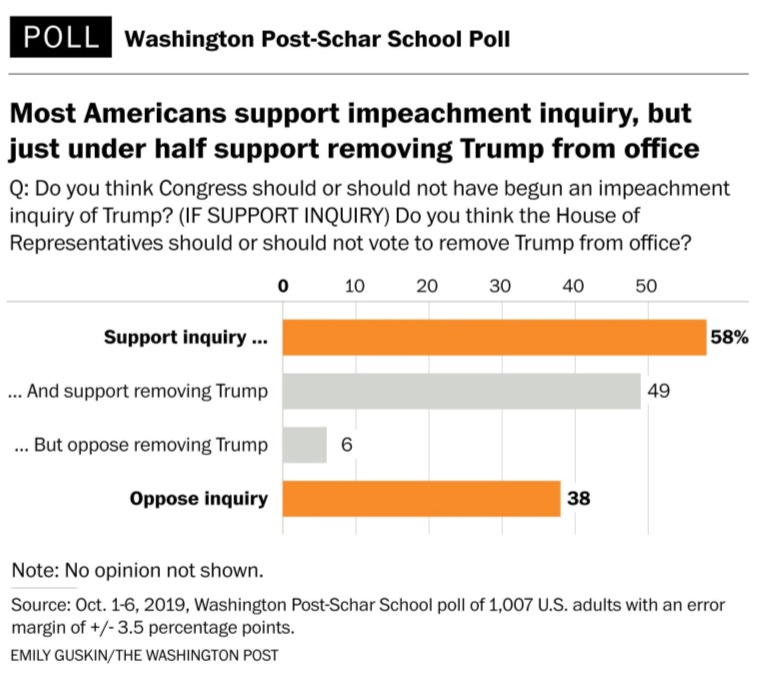Tuesday in Whitewater will be mostly sunny with a high of sixty-five. Sunrise is 7:00 AM and sunset 6:23 PM, for 11h 22m 51s of daytime. The moon is a waxing gibbous with 75.8% of its visible disk illuminated.
Today is the one thousand sixty-fourth day.
Whitewater’s Public Works Committee meets in at 6 PM.
On this day in 1871, the Peshtigo Fire kills over a thousand:
On this date Peshtigo, Wisconsin was devastated by a fire which took 1,200 lives. The fire caused over $2 million in damages and destroyed 1.25 million acres of forest. This was the greatest human loss due to fire in the history of the United States.
Recommended for reading in full:
Dan Balz and Scott Clement report Majority of Americans say they endorse opening of House impeachment inquiry of Trump:
The findings indicate that public opinion has shifted quickly against the president and in favor of impeachment proceedings in recent weeks as information has been released about Trump’s efforts to pressure Ukrainian government officials to undertake an investigation into former vice president Joe Biden, a potential 2020 campaign rival, and Biden’s son Hunter.
Previous Post-Schar School or Post-ABC News polls taken at different points throughout this year found majorities of Americans opposing the start of an impeachment proceeding, with 37 percent to 41 percent saying they favored such a step. The recent revelations appear to have prompted many Americans to rethink their position.
Jeffrey Toobin observes Donald Trump’s Ukraine Scandal Has Its Roots in Russia:
But the Russia and Ukraine scandals are, in fact, one story. Indeed, the President’s false denials in both of them capture the common themes: soliciting help from foreign interests for partisan gain, followed by obstruction of efforts to uncover what happened. Both, too, share roots in Vladimir Putin’s Russia. Mueller’s two indictments of Russian interests—the first involving the use of social media and the second the hacking of Democratic Party e-mails—are perhaps the most detailed chronicle ever published of foreign interference in a U.S. political campaign. Trump’s team was appreciative. When a public-relations adviser to a Russian oligarch’s family e-mailed Donald Trump, Jr., offering dirt on Hillary Clinton that was “part of Russia and its government’s support for Mr. Trump,” the candidate’s son gave a straightforward reply: “If it’s what you say I love it.”
Just two years earlier, Putin had invaded Ukraine and annexed Crimea. The government in Kiev went back and forth between leaders who wanted to accommodate Putin’s regime and others who wanted to enlist the help of the West to push back against it. The political consultant of choice for the pro-Russian faction was Paul Manafort, who served as Trump’s campaign chair in the summer of 2016. As Mueller documented, Manafort passed proprietary campaign polling data to pro-Russian Ukrainians. The campaign-era Trump portrayed in the report suffered from one major limitation: he wasn’t President. He clearly welcomed Putin’s assistance, and promised a better relationship with Russia, but he was still just a businessman from New York. The whistle-blower’s complaint is the epilogue to Mueller’s report: the coming of age of an aspiring colluder.


